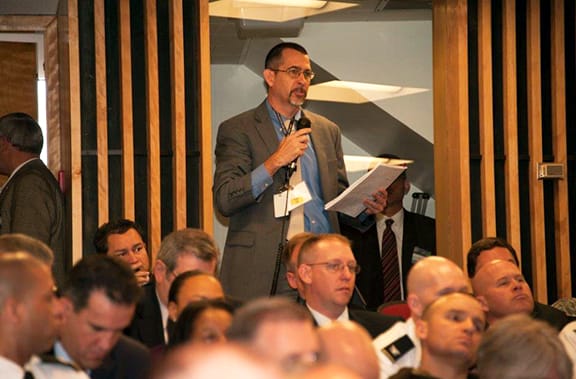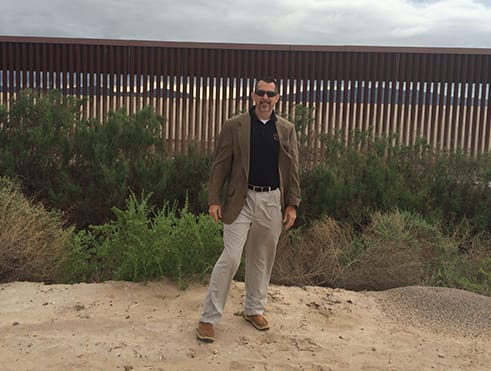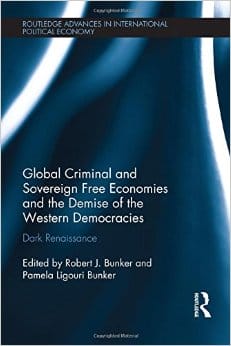Robert Bunker: The Art of (Future) War

On August 27, 2009, Al-Qaeda member Abdullah Hassan al-Asiri attempted to assassinate the deputy crown prince of Saudi Arabia. The means—half a kilogram of plastic explosive concealed inside the body of the suicide bomber—took some by surprise.
But not Robert J. Bunker.

A highly regarded expert on counterterrorism, criminal organizations, and drug cartels, the CGU alumnus (MA, Government, 1987; PhD, Political Science, 1993) had been warning the authorities about the emerging threat of “body cavity bombs” as early as 2006.
Bunker’s deep knowledge of history and current political, economic, and military factors enable him to develop strategic recommendations and briefings to law enforcement and national security officials. He has conducted research for the FBI Academy and think tanks, warned members of Congress, and advised the US military.
“My view is you need to know the weaponry, the tactics, and the technology because that influences operations and, of course, operations influence your strategies and everything else,” said Bunker, also a former adjunct professor at CGU.
“Sucker Punched”
Bunker first became interested in studying terrorism in the wake of the 1983 bombing of barracks housing US Marines in Beirut, Lebanon, by jihadists. At the time, he was working on four undergraduate degrees at California State Polytechnic University, Pomona.
More than 240 American servicemen were killed in the Beirut attack. It is considered the deadliest single-day death toll in the history of the US Marine Corps since World War II.
“That kind of struck me hard,” Bunker said, adding that “love of country” motivates his work.

At this time, he was beginning to study the role of “violent non-state actors” (VNSAs), or individuals who are not formally affiliated with any established country or institution, but nevertheless are active in international conflicts. They challenge traditional state authority and national divisions and blur the definitions of “crime” and “war,” Bunker said. Examples of modern-day VNSAs include Mexican drug lords, Somali pirates, and members of the Islamic State of Iraq and Syria (ISIS).
During transitional periods of history, formerly low-profile VNSAs can rise to dominance, often filling vacuums left by collapsed regimes. Military and police authorities can be taken by surprise by VNSAs as these agencies are typically geared to confront conventional aggressors and traditional tactics.
“That’s the problem,” Bunker said. “It doesn’t fit within our modern paradigms.”
“The problem is that during these periods of transition, [these lines] blur,” he added. “What’s a terrorist? What’s a narco enforcer? What’s a Somali warlord? Are they a criminal? Are they a soldier? What was 9/11? Was it a criminal act? Or was it an act of war? . . . It’s this whole blending, this whole crime/war gray area that I look at. That’s my specialty.”
Bunker’s research underscores the constantly evolving role that VNSAs play in global affairs. As a scholar, researcher, and consultant, he has been a steadfast voice to authorities to watch and be wary.
“What happened [during the 1983 Beirut bombing] was, this was the Marine Corps, part of the strongest country in the world, and they took these [terrorists] for granted and they got sucker punched,” Bunker said.
Bunker has brought his expertise to bear on behalf of numerous civilian as well as government organizations.
The Future of Policing
Bunker is currently the 2015 Futurist in Residence for the FBI Academy’s Behavioral Research & Instruction Unit. He also served in this capacity from 2006 to 2007.
John Jarvis, a senior scientist with the FBI Academy, described Bunker’s work as “very impressive.”
“He has been continuing to contribute to the future of policing,” he said. “I have nothing but the highest praise for Robert Bunker.”
Bunker is also a fellow focused on counterterrorism for TRENDS Research & Advisory, a United Arab Emirates-based network of international experts that provides geopolitical and macroeconomic analysis for leaders and policy makers.

He recently concluded his term as a Minerva Chair and visiting professor at the Strategic Studies Institute (SSI) at the United States Army War College. The Minerva program is a Department of Defense-sponsored research initiative focused “on areas of strategic importance to US national security policy,” according to Institute Director Douglas C. Lovelace Jr.
Bunker’s SSI writings are distributed to key strategic leaders in the Army and Department of Defense, the military educational system, Congress, the media, other think tanks and defense institutes, and major colleges and universities, Lovelace said.
“I have a theoretical side where I am trying to see the big picture and understand the connection on how things are evolving and emerging,” Bunker said. “On the other hand, I also have that practical side. How does this support law enforcement? How does this support the US military, the US government? That duality.”
Bunker was a founding member of the Los Angeles Terrorism Early Warning Group in 1996, and he is a senior fellow with Small Wars Journal – El Centro, a nonprofit group devoted to analysis of guerilla wars and criminal insurgencies in Latin America. He also served as a terrorism instructor for the California Governor’s Office of Emergency Services and has undergone advanced forms of peace officer and hazardous materials training.
Conflict and War

Bunker’s writings on politics, military history, drug gangs, and terrorist tactics are extensive—he has written or edited hundreds of articles, papers, presentations, and briefings.
Some of Bunker’s key books include Crime Wars and Narco Terrorism in the Americas, Non-State Threats and Future Wars, and Fifth Dimensional Operations: Space-Time-Cyber Dimensionality in Conflict and War.
Bunker co-edited Global Criminal and Sovereign Free Economies and the Demise of the Western Democracies: Dark Renaissance with Pamela Ligouri Bunker, his wife and a CGU alumna (MA, Politics and Policy, 1994).
One of Bunker’s treatises—“Fighting Irregular Fighters: Defeating Violent Non State Actors”—won first place in 2014 for being the best article published by a US Army War College publication on the topic of strategic landpower.
Bunker, with CGU alumnus Byron Ramirez (MS, Management, 2007; MA Economics, 2012), recently edited a report examining the use of submarines by drug cartels that was done for the Foreign Military Studies Office, a research organization of the US Army. Bunker and Ramirez previously wrote about “narco tanks,” cars that are equipped with armor and weapons to be used by Mexican drug lords.
Whether through his books or briefings, Bunker’s writings and research have served as early warnings.
“Foremost Authority”
Starting in September 2006, Bunker began a series of presentations to homeland security officials discussing the projected use of body cavity bombs by suicide bombers. Criminal organizations had already been using body cavities to smuggle drugs and other forms of contraband. But using this method to conceal an explosive was—as Bunker pointed out—the next evolution in suicide-bomb tactics.
When Al-Qaeda member al-Asiri hid an improvised bomb inside his lower intestinal tract in an attempt to kill Muhammad bin Nayef, Saudi Arabia’s minister of interior and the country’s deputy crown prince, it proved Bunker’s forecast correct.
In a 2013 paper, “The Projected Al Qaeda Use of Body Cavity Suicide Bombs Against High Value Targets,” that drew from his earlier presentations, Bunker wrote, “[We] have now entered a very dangerous window of vulnerability with regard to body cavity suicide bombs utilized against high-value targets such as commercial aircraft, but also against similar targets such as heads of state and other very important persons (VIPs).”
The FBI’s John Jarvis and others credited Bunker for his pioneering work.
“He’s probably the foremost authority on body cavity bombs, way ahead of where futurists are in that potential threat,” Jarvis said.
In September 2011, Bunker spoke about Mexican drug cartels during a joint hearing before the House Committee on Foreign Affairs. He warned members of Congress that the “cartels and narco-gangs of the Americas, with those in Mexico of the highest priority, must now be elevated to the No. 1 strategic threat to the United States.”
Bunker has also written about emerging cult practices and death worship professed by certain cartels in Mexico. It could be a fringe element, or a possible new form of “spiritual insurgency,” he said.
In a 2010 paper, Bunker advised US authorities to consider providing support to Mexican law enforcement and military agencies as well as forces operating along the American-Mexican border in an effort to counter a possible rise in cartel car bombings.
Bunker always works with experts and professionals steeped in other disciplines and fields.
“When I am doing this work, I have to make sure that I have it vetted by experts, not necessarily PhDs, but tactical experts on what I’m doing,” he said. “Potentially, I can make recommendations that could get people killed if they are the wrong recommendations. You have to be very cognizant of that. That’s your due diligence.”
Cartels in the Classroom
Bunker’s subject-matter expertise has also made its way into universities and in the media.
He taught a “Homeland Security and Public Policy” class as an adjunct professor at the University of Southern California. At California State University, San Bernardino, he taught for years in the school’s national security studies program.
At CGU, Bunker taught in the School of Social Science, Policy & Evaluation’s Division of Politics and Economics. His courses were “US Foreign and Defense Policy” and “Underground Economies and Shadow Governments” (team taught), and he was also involved in independent studies and participated in thesis and dissertation committees.
Bunker is often quoted as an expert in newspapers and magazines.
He was quoted in a March 2014 article in Popular Science about a sophisticated communication network established by Mexico’s Gulf Cartel.
Bunker was also interviewed at length in a September 2013 Epoch Times article discussing the problems Mexican government officials were having with Chinese nationals smuggling in methamphetamine precursor chemicals such as ephedrine.
“I don’t have the right answers, I have the right questions. Because I am working out a post-modern paradigm,” Bunker said, “I tend to know what the questions are that should be asked.”